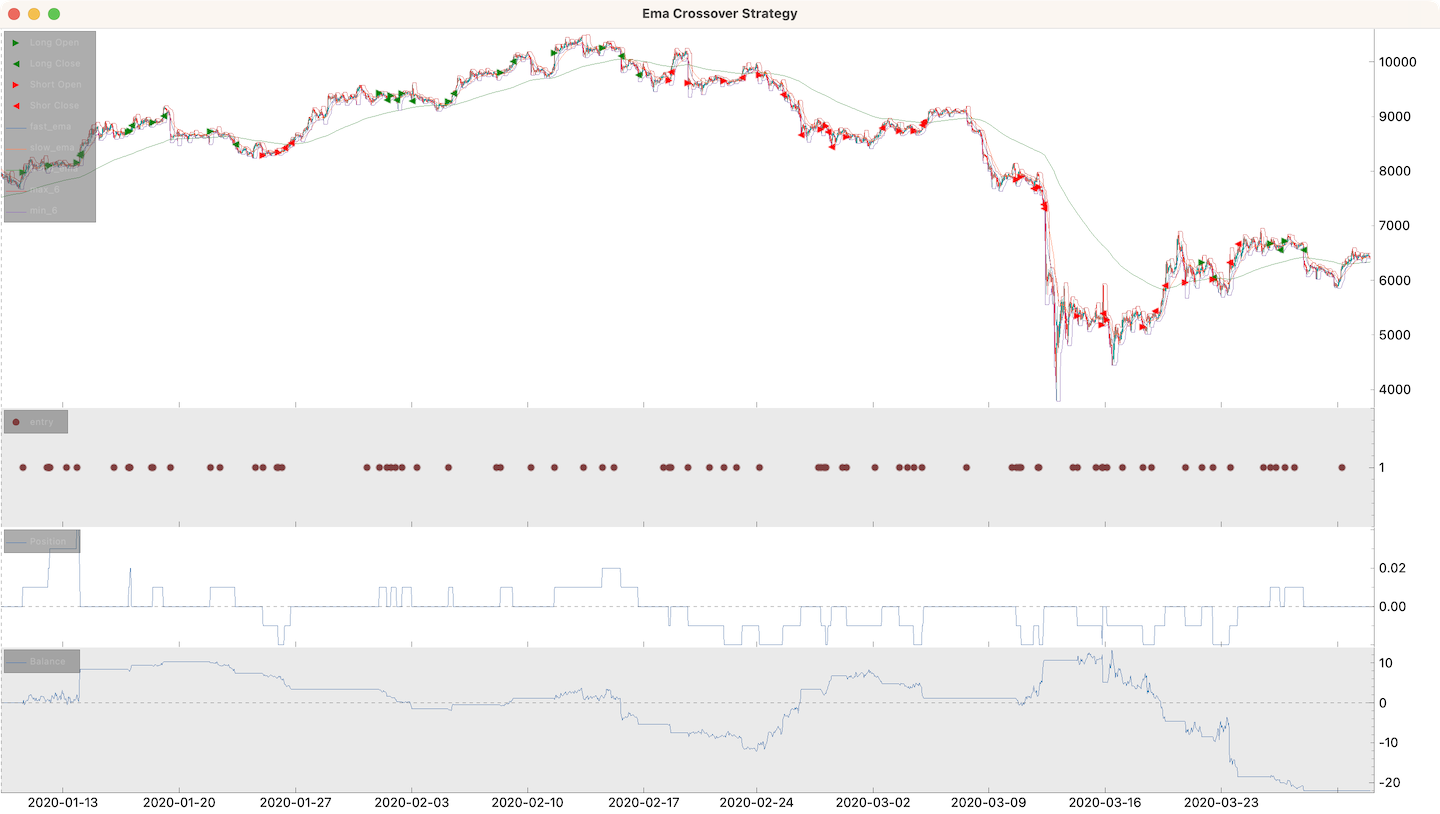Introduction

Cipher stands apart from most backtesting frameworks by focusing on position adjustments within the scope of individual trading sessions.
Core Concepts
Cipher uses distinctive terminology that reflects its session-based approach:
buy→add to positionsell→reduce positiontrade→session(trading session)close trade→close session(achieved by adjusting position to 0)market order→transaction(executed when position changes)limit/stop orders→brackets
Key Features
- Clean Architecture: Well-structured, intuitive, and easily extensible
- Concurrent Sessions: Support for multiple simultaneous trading sessions
- Advanced Exit Strategies: Implement sophisticated strategies like trailing take profits
- Multi-Source Data: Support for multiple exchanges, symbols, and timeframes
- Modular Design: Signal generation and handling are cleanly separated
- Simple Execution: Run strategies with just
python my_strategy.py - Cloud Ready: Compatible with Google Colab
- Flexible Visualization: Built-in support for finplot and mplfinance
Note: Cipher is designed exclusively for backtesting and does not support forward testing, paper trading, or live trading.
Example Strategy
Here's an EMA crossover strategy implementation:
import numpy as np
import talib
from cipher import Cipher, Session, Strategy
class EmaCrossoverStrategy(Strategy):
def __init__(self, fast_ema_length=9, slow_ema_length=21, trend_ema_length=200):
self.fast_ema_length = fast_ema_length
self.slow_ema_length = slow_ema_length
self.trend_ema_length = trend_ema_length
def compose(self):
df = self.datas.df
# Calculate EMAs using talib
df["fast_ema"] = talib.EMA(df["close"], timeperiod=self.fast_ema_length)
df["slow_ema"] = talib.EMA(df["close"], timeperiod=self.slow_ema_length)
df["trend_ema"] = talib.EMA(df["close"], timeperiod=self.trend_ema_length)
# Calculate crossover signal
df["difference"] = df["fast_ema"] - df["slow_ema"]
# Signal columns must be boolean type
df["entry"] = np.sign(df["difference"].shift(1)) != np.sign(df["difference"])
# Calculate support and resistance levels using talib
df["max_6"] = talib.MAX(df["high"], timeperiod=6)
df["min_6"] = talib.MIN(df["low"], timeperiod=6)
return df
def on_entry(self, row: dict, session: Session):
# Long position: bullish crossover above trend
if row["difference"] > 0 and row["close"] > row["trend_ema"]:
session.position += "0.01"
session.stop_loss = row["min_6"]
session.take_profit = row["close"] + 1.5 * (row["close"] - row["min_6"])
# Short position: bearish crossover below trend
elif row["difference"] < 0 and row["close"] < row["trend_ema"]:
session.position -= "0.01"
session.stop_loss = row["max_6"]
session.take_profit = row["close"] - 1.5 * (row["max_6"] - row["close"])
# Optional: Custom signal handlers
# def on_<signal>(self, row: dict, session: Session) -> None:
# """Custom signal handler called for each open session.
# Use this to adjust positions or modify brackets."""
#
# # Position adjustment examples:
# # session.position = 1 # Set absolute position
# # session.position = base(1) # Same as above
# # session.position = '1' # Auto-converts to Decimal
# # session.position = quote(100) # Set position worth 100 quote units
# # session.position += 1 # Add to position
# # session.position -= Decimal('1.25') # Reduce position
# # session.position += percent(50) # Increase by 50%
# # session.position *= 1.5 # Same as percent(50)
# pass
# def on_take_profit(self, row: dict, session: Session) -> None:
# """Called when take profit is hit. Default: closes position.
# Override to adjust position/brackets and continue session."""
# session.position = 0
# def on_stop_loss(self, row: dict, session: Session) -> None:
# """Called when stop loss is hit. Default: closes position.
# Override to adjust position/brackets and continue session."""
# session.position = 0
# def on_stop(self, row: dict, session: Session) -> None:
# """Called when dataframe ends with open sessions.
# Use this to close positions, otherwise they're ignored."""
# session.position = 0
def main():
# Initialize and configure Cipher
cipher = Cipher()
cipher.add_source("binance_spot_ohlc", symbol="BTCUSDT", interval="1h")
cipher.set_strategy(EmaCrossoverStrategy())
cipher.set_commission("0.00075")
# Run backtest
cipher.run(start_ts="2020-01-01", stop_ts="2020-04-01")
# Display results
print(cipher.sessions)
print(cipher.stats)
cipher.plot()
if __name__ == "__main__":
main()

Risk Disclaimer
This software is intended for educational purposes only. Never risk capital you cannot afford to lose.
USE THIS SOFTWARE AT YOUR OWN RISK. The authors and affiliates assume no responsibility for trading results or financial losses incurred through the use of this software.